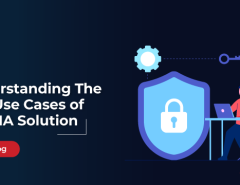Financial industry is one of the most lucrative targets for cyber criminals. It is a rich source of information that can be directly used by them for personal gains. Attacks on financial enterprises happen on daily basis all around the world. Criminals target not only the large but also medium and small firms. The smaller firms usually haven’t matured to develop a well-defined security policy and do not have enough resources to dedicate for their cybersecurity. Thus, they are most vulnerable to attacks. However, if such firms avoid making some crucial mistakes about their security, they may be able to secure their systems from cyber criminals.
Here are some of the mistakes that can be easily avoided by Fintech firms to ensure robust cyber security:
1. Poor identity and authentication management – Customers want to access the services via multiple channels. Fintech firms in their zeal to capture the market, launch various versions of their product for desktops, mobile web and mobile app without understanding the security impact and requirements of each channel. These devices offer to save passwords on the device itself for the ease of use. This becomes a security risk. A malicious code can hack devices and retrieve those passwords. Fintech firms must employ advanced authentication features such as one-time password, 2-factor authentication, bio-metric authentication etc., for access to their service. Such methods ensure that security information is not saved on the device and thus cannot be hacked. Some of the advanced security services use Artificial Intelligence to analyse user behavior and provide risk based authentication.
2. Undertrained workforce– Fintech is a very dynamic and fast paced industry. New people join the organization very frequently and immediately start working on the product. They don’t devote enough time to understand the security policies and procedures of the organization. As a result, there is a higher probability of security policy not being followed, leading to higher chances of security breach. Fintech organizations must ensure that new joinees are thoroughly trained on security procedures and policies that they must follow. Regular refresher training on security should be conducted and must be mandatory for all employees. They must understand the spirit behind the security rules and procedures and appreciate their benefits.
3. Insecure data transmissions – Fintech is a data transfer intensive industry. There are vendors, customers, enterprise applications and bank or payment gateways that are always connected to each other. There is business critical and financial data flowing between various organizations and independent individuals (customers) all the time. Further, all these entities connect from multiple platforms such as desktops, mobile web, mobile apps and tablets. If any one of these connections becomes vulnerable to a breach, then all the entities can be potentially compromised. Companies need to ensure that all data transmission is done on secured networks, using secured channels (SSL) and all data must be encrypted even before it enters the data transmission systems.
4. Using public cloud – Public clouds, especially those from smaller, lesser known providers,come with their own challenges. These clouds are more vulnerable to attack and the enterprise data is always at risk. It is also possible that an organization gets locked out of its own data on a public cloud, due to an attack on the cloud. Fintech companies should be very careful with their decision to move to a public They should have very strong security measures and work with very reliable cloud vendors, even if these vendors charge a premium. For the best results, enterprises should strive to develop their own private cloud which in under their security and control.
5. Dated security measures– Cyber crime world is evolving at a rapid speed with newer threats surfacing every day. However, to combat the criminals, the security technology is also upgrading itself at similar speed. Enterprises need to upgrade their security policies and tools regularly to make sure they are protected against all threats. Many firms treat security as an ‘install it and forget it’ solution. As a result, their security policies and tools become out of date very soon and do not provide protection against newer sources of threat. Enterprises must regularly review and update their security policies and tools and keep themselves abreast of any new threat. It is imperative that there is separate role such as a CISO which is focused on cyber security at the enterprise At the minimum, enterprises should implement a tool that gets regular updates for protection against new threats.
Fintech companies handle sensitive financial data including bank account and credit card details of its customers. This makes them a favorite amongst hackers and thus they are constantly bombarded with new attacks. In such a scenario, no company can afford to implement anything less than top notch security practices and tools. Products such as Seqrite End Point Protection and Seqrite Terminator implement the security solutions that are flexible, scalable, stay up to date and provide protection against most modern kinds of threats.
Seqrite helps businesses simplify IT security and maximize business performance. To know more about our products and services visit our website or




